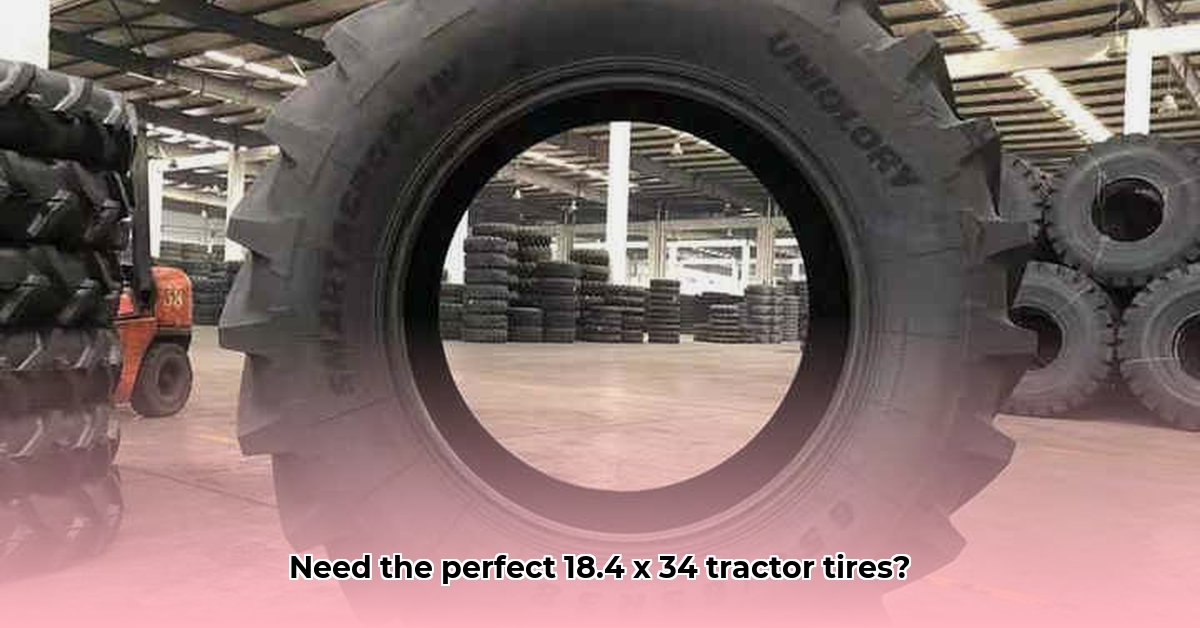
Choosing the right tires for your 18.4 x 34 tractor is crucial for maximizing efficiency and minimizing costs. This guide provides a practical approach to selecting the best tires for your needs, even with limited readily available technical data. For additional size conversion information, check out this helpful resource.
Understanding Your Needs and the Available Data
Before we delve into specifics, let's acknowledge a key challenge: comprehensive technical data on 18.4 x 34 tractor tires isn't always easy to find. However, we can still make informed decisions by focusing on practical factors and available information such as "easy test scores" (where provided). What kind of soil do you primarily work with? What are your typical loads? Heavy clay soils demand superior traction, whereas lighter soils might allow for more cost-effective choices. Understanding your operations informs your tire priorities.
Decoding the "Easy Test Score"
Many online retailers use an "easy test score" to rate tires; however, the exact methodology behind this score is usually unclear. Think of it as a relative performance indicator: a higher score generally suggests better overall performance, encompassing factors like durability, traction, and fuel efficiency. But remember, a higher score often correlates with a higher price. Therefore, the "easy test score" must be judiciously weighed against the price to find the best value for your money. Would you pay more for a work boot guaranteed to last five years over one expected to last only two, if both get the job done? The same principle applies to tires.
Key Features to Prioritize
While precise comparisons are difficult without complete technical specifications, several key features consistently matter:
Durability: A longer-lasting tire minimizes replacements and downtime, translating to significant long-term savings. Consider it the backbone of reliable operation – a tough tire that can endure daily wear and tear.
Traction: Excellent traction is paramount, especially on wet or muddy terrain. It reduces wheel slip, saves fuel, and minimizes soil compaction, ultimately benefiting both your yields and your bottom line.
Fuel Efficiency: Tires with lower rolling resistance use less fuel, representing substantial cost savings over time. This is often related to the tire's design and the materials used in its construction.
Budgeting and Cost Analysis: Long-Term Value
Don't solely focus on the initial price. Consider the "easy test score" (if available), warranty, and return policies when assessing value. A slightly higher upfront cost might be justified if it translates to superior performance and a significantly longer lifespan. A tire with a higher "easy test score" and a longer warranty might ultimately be cheaper over its lifetime, even if its initial price is higher.
Choosing Your Supplier: Due Diligence
The supplier you choose is as important as the tires themselves. Prioritize these factors:
Reputation: Search online for reviews and seek recommendations from fellow farmers. Look for vendors with consistent positive feedback.
Warranties: A strong warranty offers protection against defects.
Return Policy: A clear and generous return policy safeguards your investment if unexpected issues arise.
Future Considerations: Sustainability and Data Transparency
The agricultural industry is embracing sustainability, so look for manufacturers committed to eco-friendly materials and production methods. Simultaneously, advocate for greater transparency from tire manufacturers. Demand more detailed performance data to make truly informed decisions.
How to Compare 18.4-34 Tractor Tire Performance and Lifespan Data (When Data is Scarce)
Reliable data comparing tire lifespan can be elusive. Here's how to make the most of limited information:
Assess Your Needs: What are your primary farming tasks? Heavy tillage requires robust tires with exceptional traction, while row cropping prioritizes minimizing soil compaction.
Interpret the "Easy Test Score" (If Available): Use it as a general guide, but always consider the price. A slightly lower score with a significantly lower price may be more cost-effective in the long run.
Prioritize Key Features: Focus on durability, traction, and fuel efficiency. Look for reviews to gather insights into real-world performance.
Budget Wisely: Think long-term. Compare the total cost of ownership (including potential replacements) to determine the best value.
Choose a Reputable Supplier: Verify their reputation, warranty, and return policies.
By using this practical approach, you can select the best 18.4 x 34 tractor tires for your farm, even in the absence of complete technical specifications. Remember, a combination of careful consideration of available data, practical evaluation, and due diligence can lead to informed decisions that improve your farm’s efficiency and profitability.